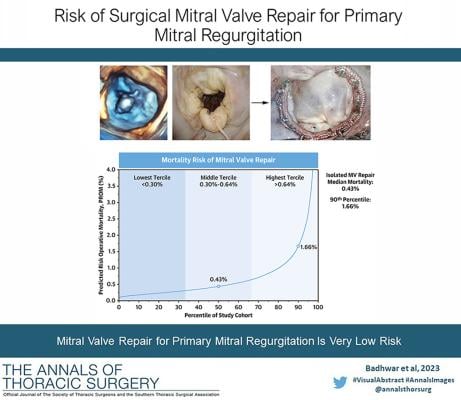
Graphic courtesy of The Annals of Thoracic Surgery
January 24, 2023 — Leakage of the mitral valve due to degenerative prolapse is a common condition known as primary mitral regurgitation (MR). Symptoms often start with shortness of breath due to blood leaking backwards into the lungs, but the condition may lead to heart failure. While the treatment has traditionally been surgical repair, recently some success has been achieved with transcatheter edge-to-edge repair using a clip-like device delivered percutaneously without surgery. The Food and Drug Administration has approved transcatheter therapy for patients deemed too risky for surgery, but current clinical trials are exploring its use in lower risk patients. Similarly, surgical valve repair has evolved with more precise techniques and less invasive approaches.
In an article published today jointly on January 18, 2023, in both The Annals of Thoracic Surgery (https://www.annalsthoracicsurgery.org/article/S0003-4975(22)01611-3/fulltext) and the Journal of the American College of Cardiology, leading cardiology and cardiothoracic surgical researchers analyzed recent national data to assess the outcomes and risk of mitral valve repair for primary MR.
Assessing information from The Society of Thoracic Surgeons Adult Cardiac Surgery Database, the team identified 53,462 patients who underwent planned surgical mitral valve repair for primary MR between 2014 and 2020. The authors found that there was an increasing frequency of operations done in a minimally invasive fashion, including robotically, and that the rate of successful repair has now reached over 90% in the United States. Most importantly, the researchers found that risk of mortality, or dying, after this surgery was extremely rare across nearly all age ranges. These data were used to develop a novel risk model for predicting 30-day outcomes based on the patient’s health conditions, which formed the basis for a new online risk calculator to assist healthcare providers to estimate the risks for their patients that will soon be available on The Society of Thoracic Surgeons’ website.
“The mortality risk model had excellent discrimination and calibration and confirmed very low mortality risk for isolated mitral valve repair,” said Robert Habib, Ph.D., lead statistician for the effort. “For the vast majority of patients, the risk of death related to this procedure was less than 1%.”
“We have two options to treat primary mitral valve regurgitation. The historical standard has been surgical repair, but we also have FDA-approved transcatheter devices for minimally invasive mitral valve repair that have encouraging results, particularly in high-risk patients with primary mitral regurgitation,” said Vinay Badhwar, MD, Professor of Cardiovascular and Thoracic Surgery from the West Virginia University and lead author of the multi-disciplinary study. “Past perceptions of the risk of surgery and repair rates based on older risk models may have influenced the design of two clinical trials to explore transcatheter therapy in lower risk older individuals. The finding of 90% successful surgical repair with less than 1% mortality now achieved in the United States sets the outcome bar fairly high when considering alternative therapies to surgery. We hope this information will help physicians and patients make more informed decisions regarding treatment, as well as to inform the optimal design of future trials in the field.”
Now, with the new risk model calculator based on contemporary data, healthcare professionals will have a much more accurate assessment of the risk of mitral repair individualized to their patient’s medical profile.
For more information: www.sts.org


 January 15, 2026
January 15, 2026 









